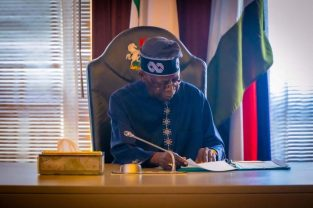There is no gainsaying that the worker’s voice is the voice of the nation (as represented by the NLC), and when we silence their struggles, we silence the soul of our country. The government must balance everyone’s needs, ensure that all people share the burdens of progress, and prevent a few from claiming all the benefits. Wait a minute, are workers robots who do not need fair compensation or basic human dignity?
Nigeria’s ongoing minimum wage negotiations have brought to the forefront the delicate balance between fiscal responsibility and social welfare.The NLC demands a higher minimum wage, but the government remains cautious, citing inflation and fiscal concerns. Can both parties find common ground, or will the impasse perpetuate economic uncertainty?
The Nigerian Labour Congress (NLC)
Inflation has eroded purchasing power, prompting the Nigerian Labour Congress (NLC) to push for a higher minimum wage. Rising CPI has eroded workers’ real wages, worsening poverty and inequality. A higher minimum wage would help restore workers’ purchasing power, boosting aggregate demand and potentially stimulating economic growth. The ILO says a decent minimum wage cuts poverty, boosts productivity, and promotes social cohesion.
However, the government’s trepidation is understandable. A significant increase in the minimum wage could lead to higher production costs, potentially fueling inflationary pressures and undermining the economy’s fragile recovery. Furthermore, the government’s fiscal space is limited, with a already-high debt-to-GDP ratio and dwindling revenue streams. The government must balance its commitment to social welfare with the need to maintain fiscal discipline and ensure economic stability.

Economic Future for all Nigerians
To reconcile these interests, both parties must engage in constructive dialogue and consider innovative, balanced solutions. One option is to gradually raise the minimum wage and link it to inflation to protect workers’ purchasing power without fueling inflation. This would help mitigate the impact on businesses, allowing them to adjust to the new wage regime without sudden shocks.
Additionally, the government could explore complementary measures to mitigate the impact on businesses, such as tax incentives or subsidies for small and medium-sized enterprises (SMEs). This would help cushion the blow of higher labour costs, ensuring that the economy’s growth momentum is not sacrificed. SMEs, which are the backbone of Nigeria’s economy, would be able to absorb the increased labour costs without compromising their competitiveness.
Another potential solution is to introduce a living wage. This approach considers the actual cost of living in different regions. It ensures that workers earn wages that reflect local conditions, rather than a uniform minimum wage that may not be realistic everywhere. However, the living wage would require careful planning to remain fair and affordable for both workers and employers.

Conclusion
Ultimately, finding common ground requires a willingness to compromise and a shared commitment to Nigeria’s economic prosperity. By engaging in constructive dialogue and exploring innovative solutions, the government and labour can go through the complex minimum wage problem, fostering a more equitable and sustainable economic future for all Nigerians. The international community has recognised the importance of social dialogue in resolving labour disputes and promoting economic growth. Nigeria can draw lessons from countries like Germany, where social dialogue has been instrumental in promoting economic stability and social cohesion.
Yes, the minimum wage negotiations in Nigeria represent a critical juncture in the country’s economic trajectory. The government and labour must cooperate to meet workers’ needs while maintaining economic stability for a stronger Nigeria.
_____________________________________________________
I am most obliged for your time here. This means a lot to us, at Inside Success Nigeria. Kindly find other related articles on our website. Do not forget to subscribe to get more updates.



Leave a Reply